Special Educational Needs and Disabilities
The Beaulieu Park School is an inclusive, all-through, mainstream school that values each of its students equally and recognises them as individuals. Our staff work very hard to provide opportunities for all the students to succeed and maximise their potential. Through a combination of high expectations, inspirational teaching and learning experiences, we aim to equip the students with the skills to become confident and independent learners. Our Special Educational Needs Co-ordinator is Mrs Appleton-White. She can be contacted via e-mail: sappleton-white@beaulieuparkschool.com

PROSPECTIVE PRIMARY PARENTS
Some parents will be aware that their child has SEND before they start school and will have spoken to and researched different Primary Schools and their offer prior to making an application. Other SEND needs will be identified by the school after a child has started.
Beaulieu is a new and growing school and we are committed to meeting the needs of all children, regardless of background or ability. Beaulieu is not an academically selective school and all children are welcome here. Our SEND provision is growing with the school and constantly evolving to meet the needs of our new students. We are very proud of our SEND students here, that we believe thrive in our ethos of family and kindness.
If you would like a conversation with the school about your child's needs and what we would do to meet them, please do get in touch.
PROSPECTIVE SECONDARY PARENTS
Beaulieu is a new and growing school. We only take in new students each September and so the school will not be full for a number of years. Our SEND department is therefore not as large and established as a school that has been operating for many years and with perhaps 1,500-2,000 children. We are committed however to meeting the needs of all children, regardless of background or ability. Beaulieu is not an academically selective school and all children are welcome here. Our SEND provision is growing with the school and constantly evolving to meet the needs of our new students. We are very proud of our SEND students here, that we believe thrive in our ethos of family and kindness.
If you would like a conversation with the school about your child's needs and what we would do to meet them, please do get in touch.
For an overview of some of the additional things we do here at Beaulieu to support our students, please click on the Pupil Premium tab under 'About Us' at the top of this page or use the link below. Many of these strategies and interventions are used for our SEND students too.
www.beaulieuparkschool.com/372/pupil-premium-funding-amp-strategy
The following slides outline some of the strategies, interventions and processes we may use for children with SEND. This should not be used as a tick-list. All children are individual and the school, in conjunction with parents and other professionals will decide the best approach for personal success.
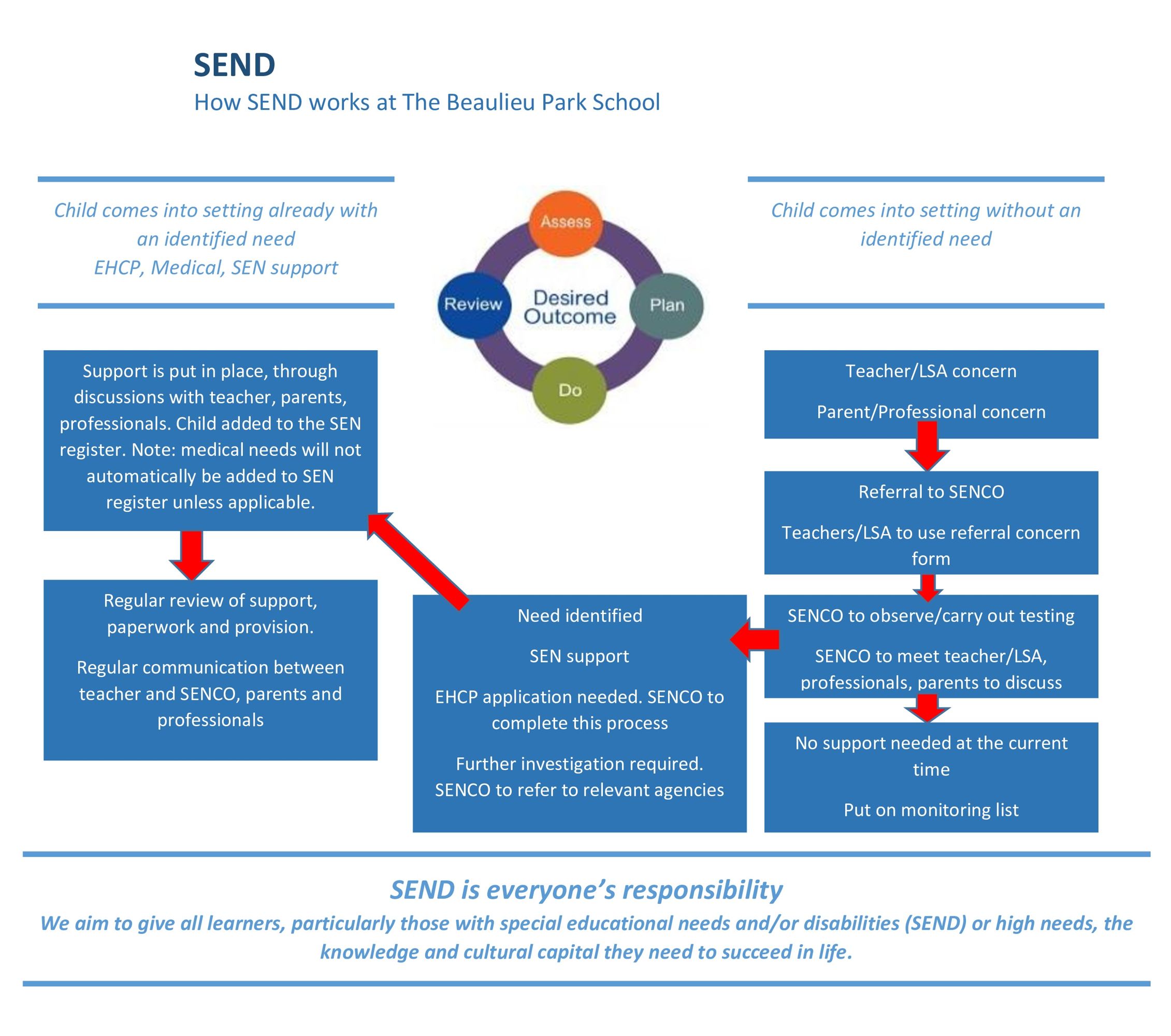
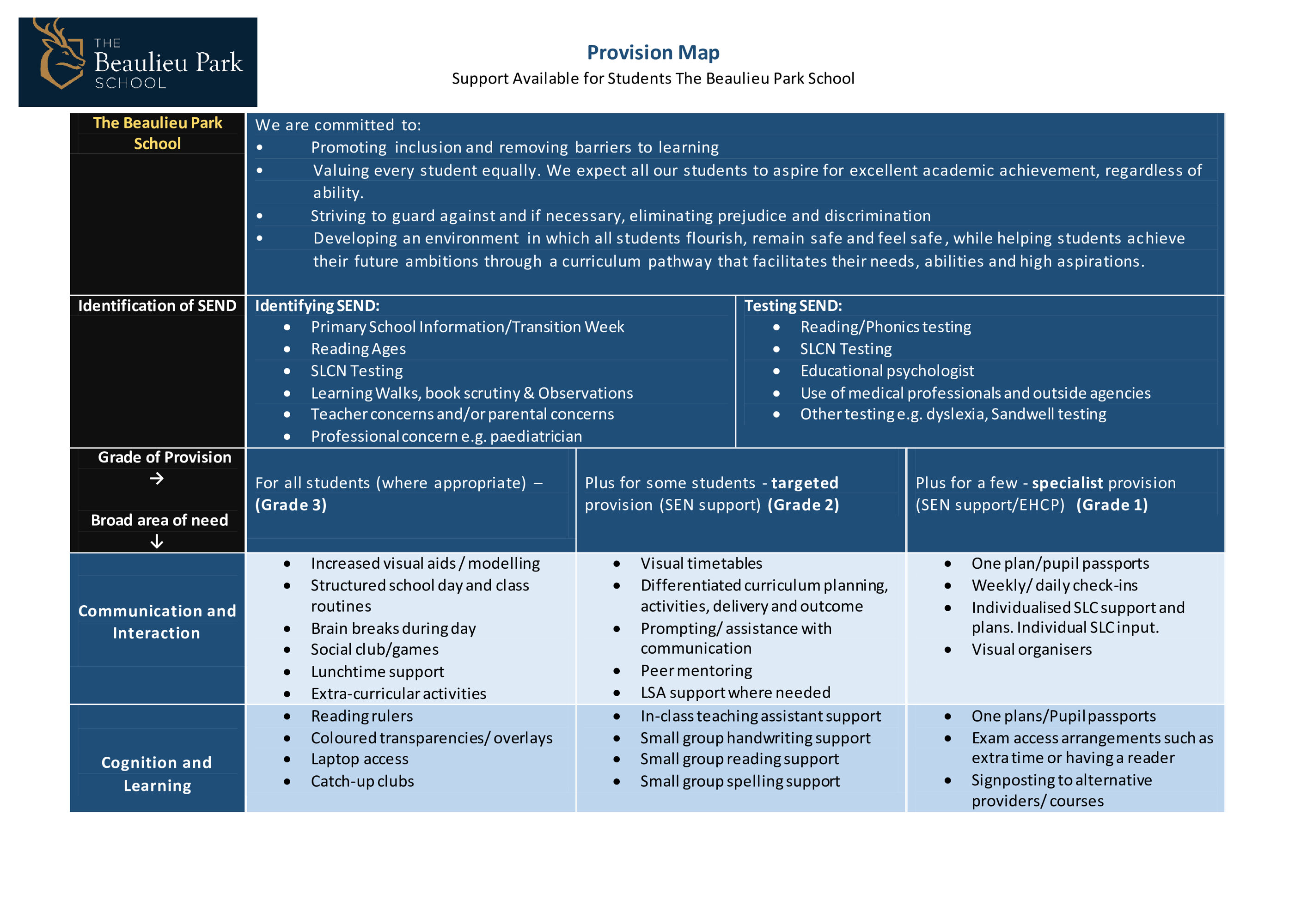
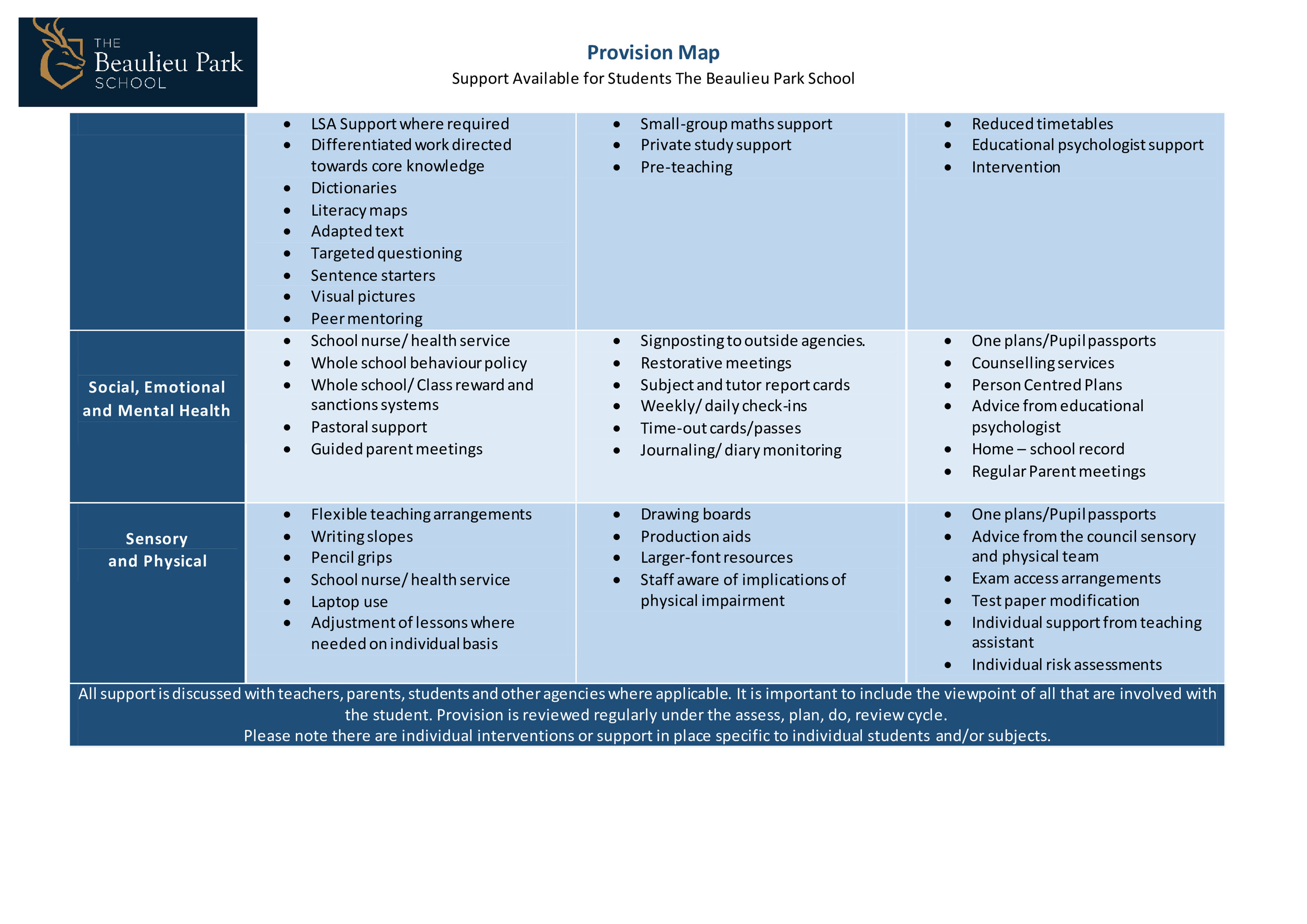
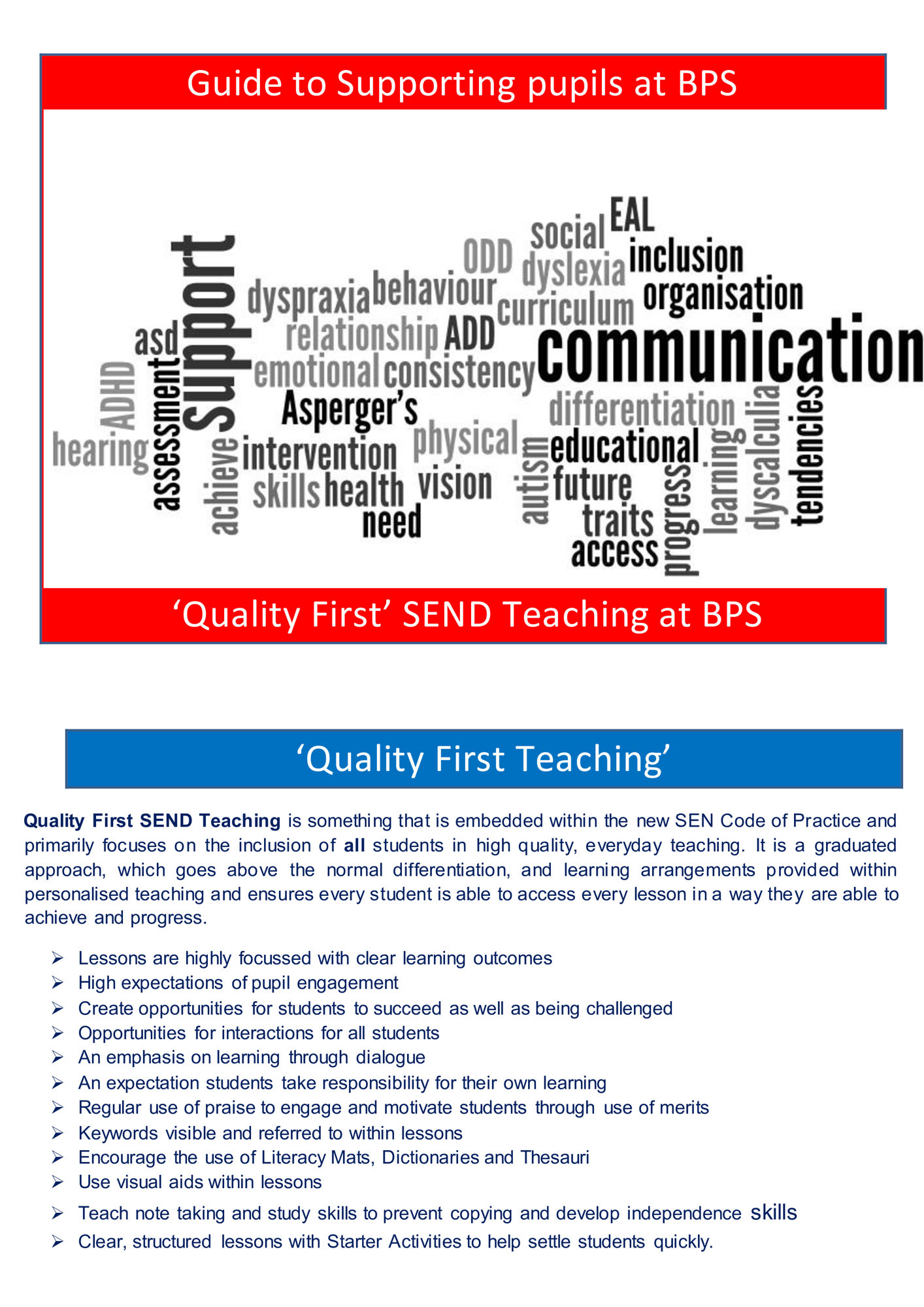
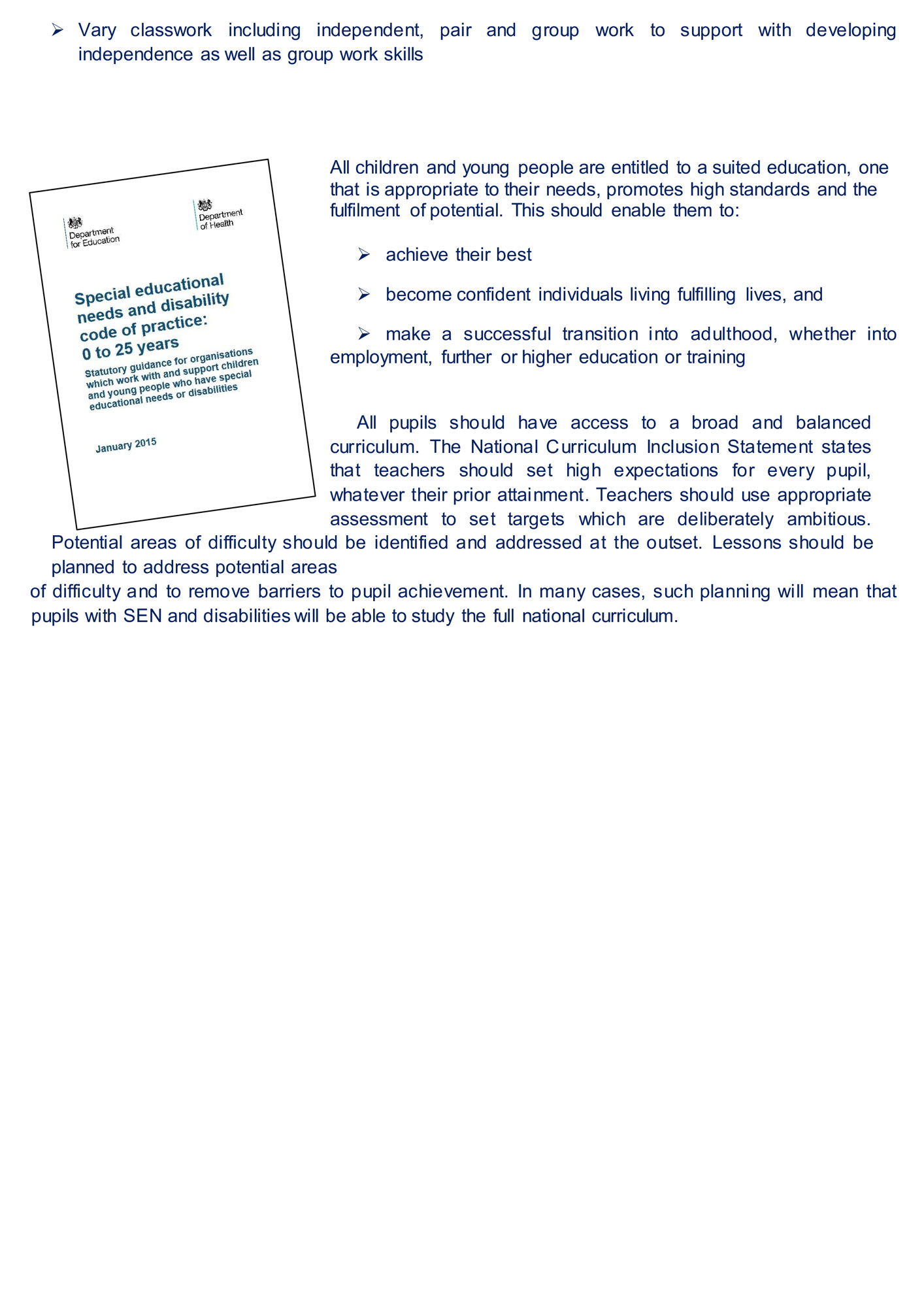
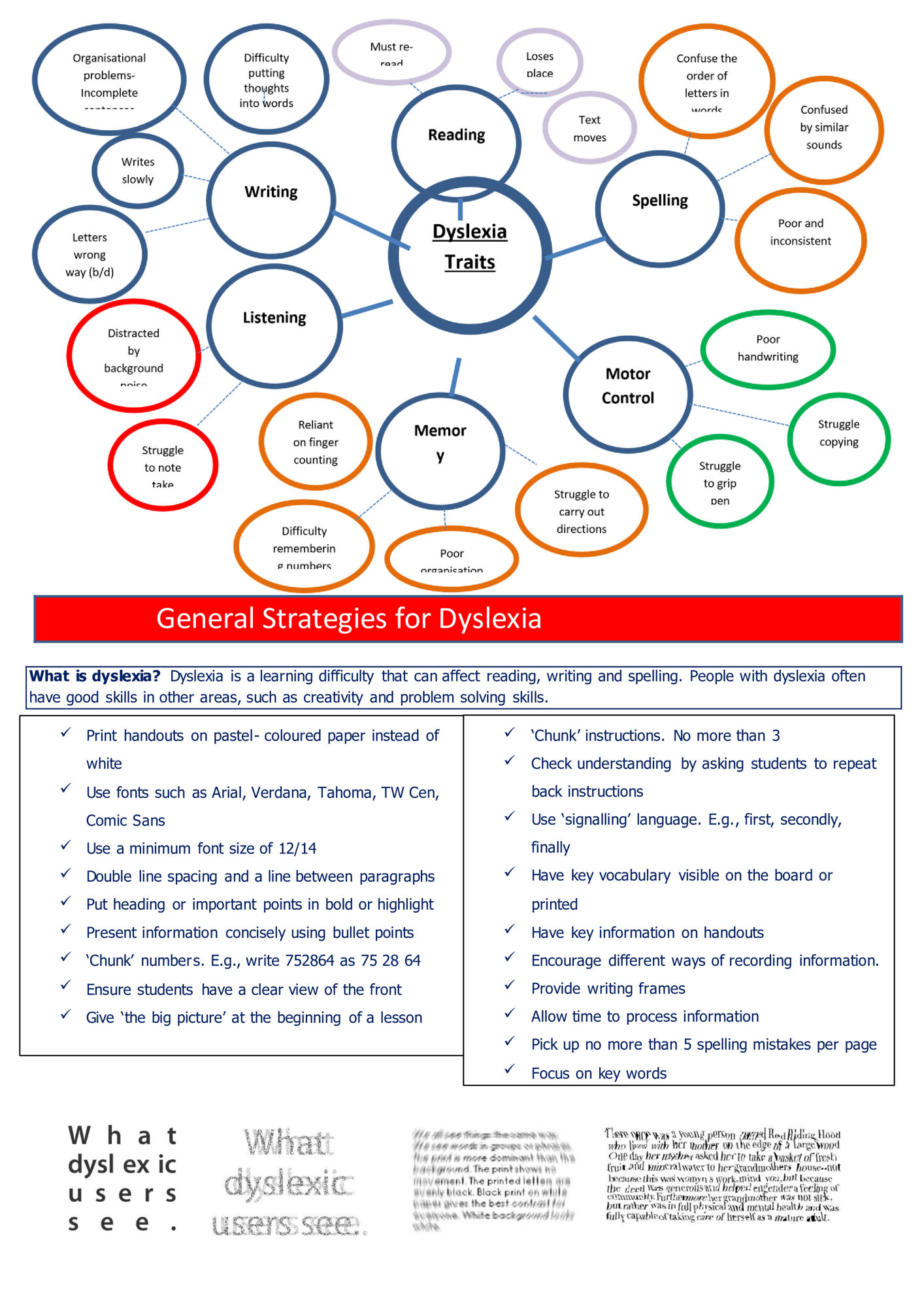
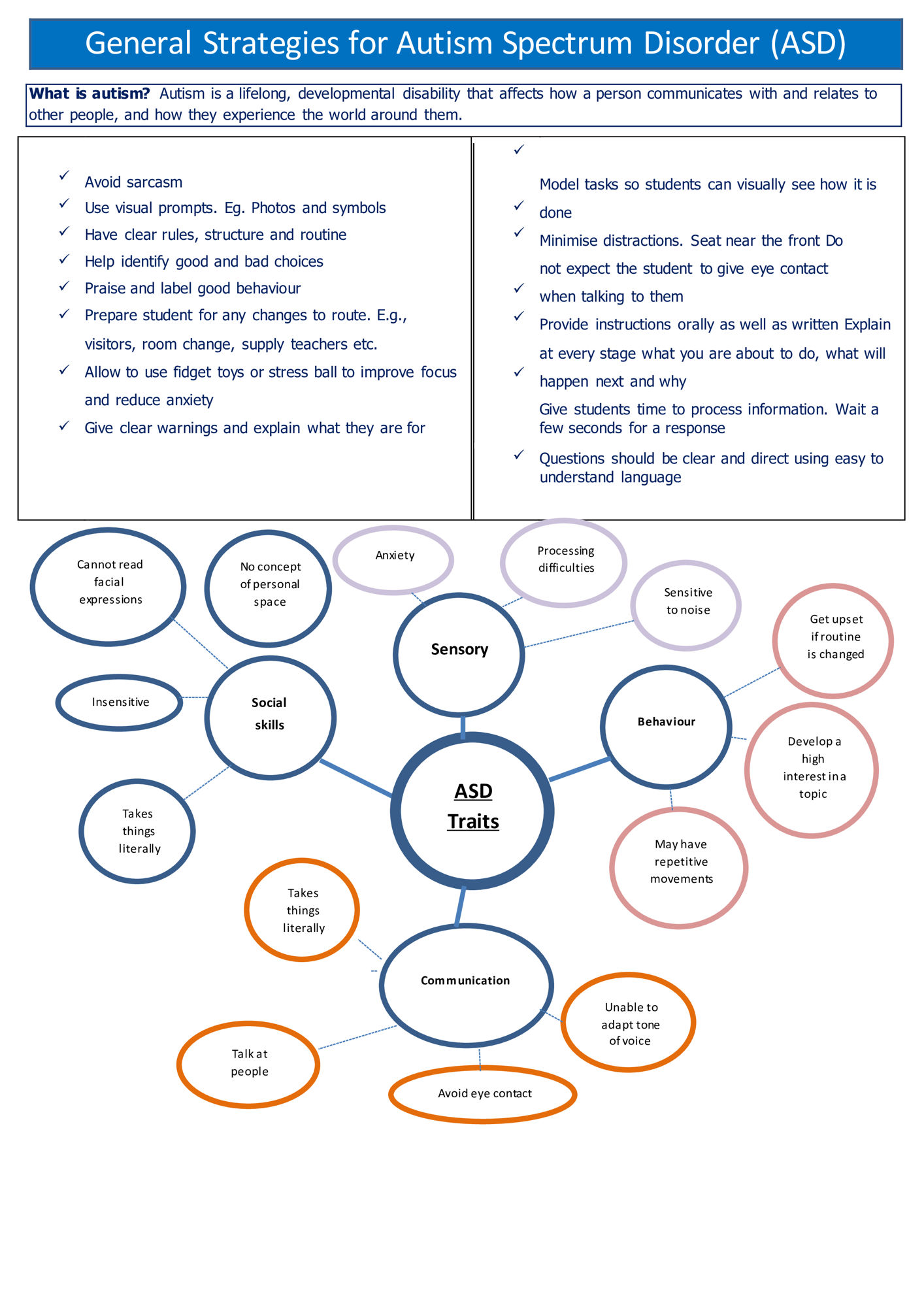
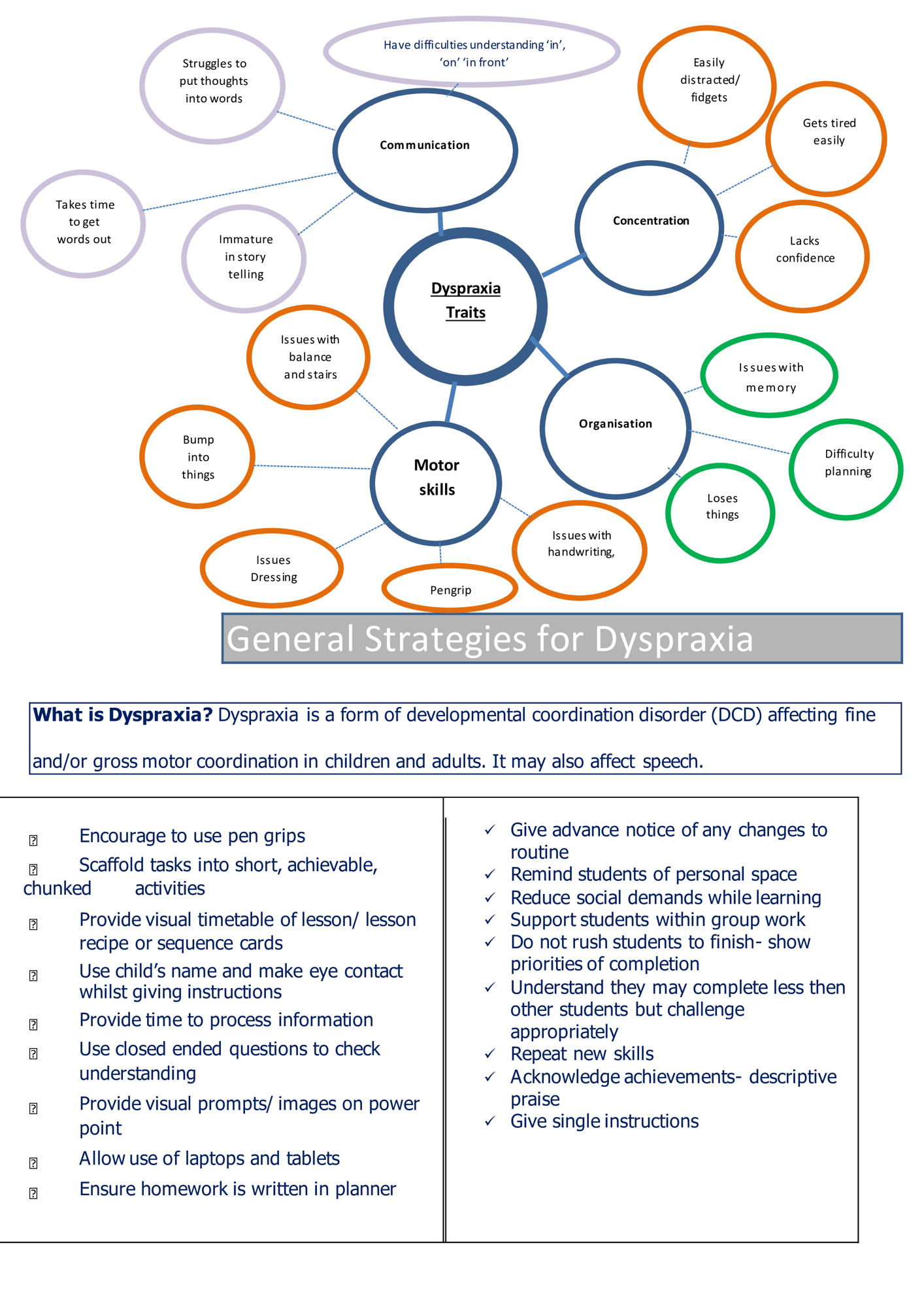
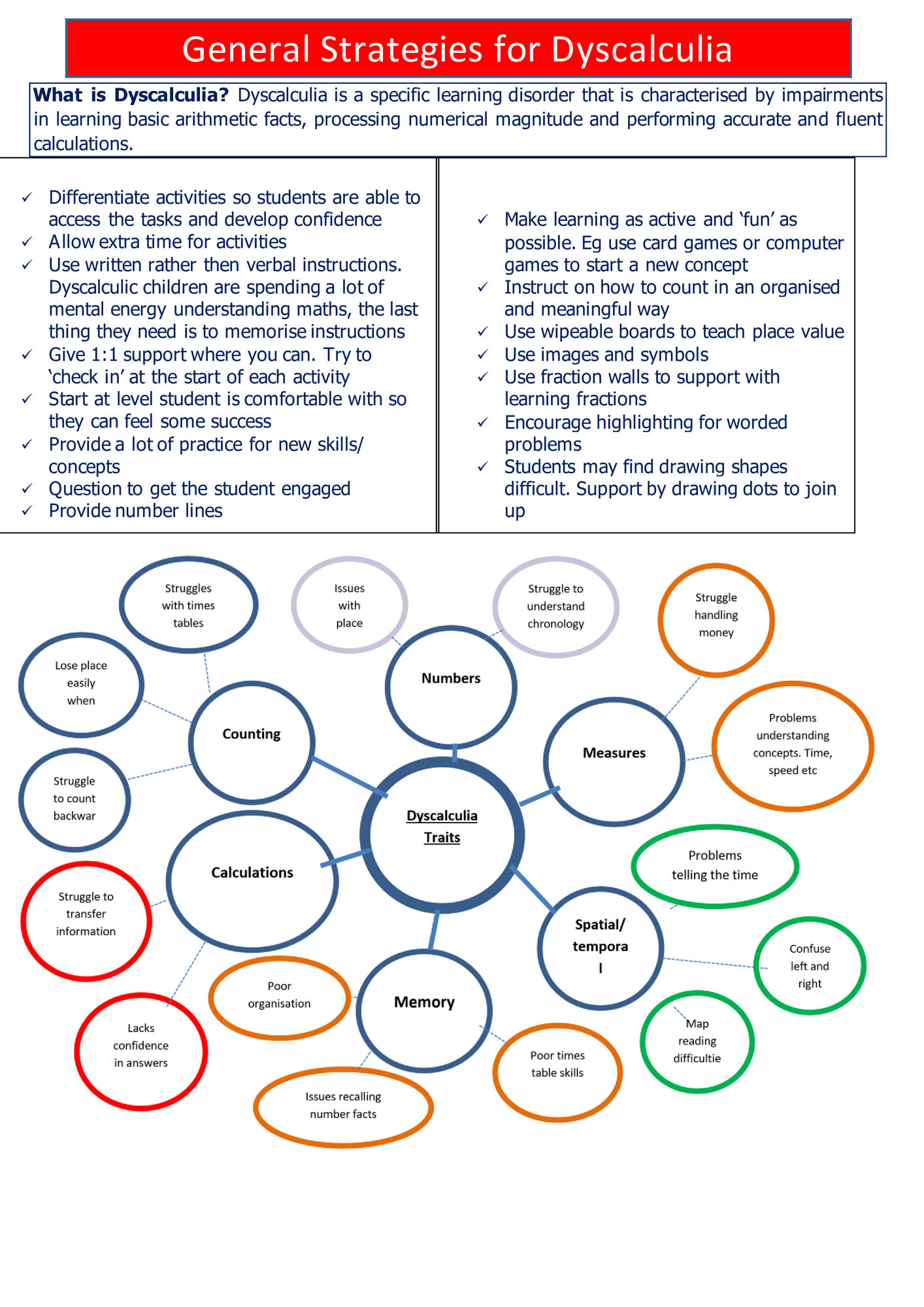
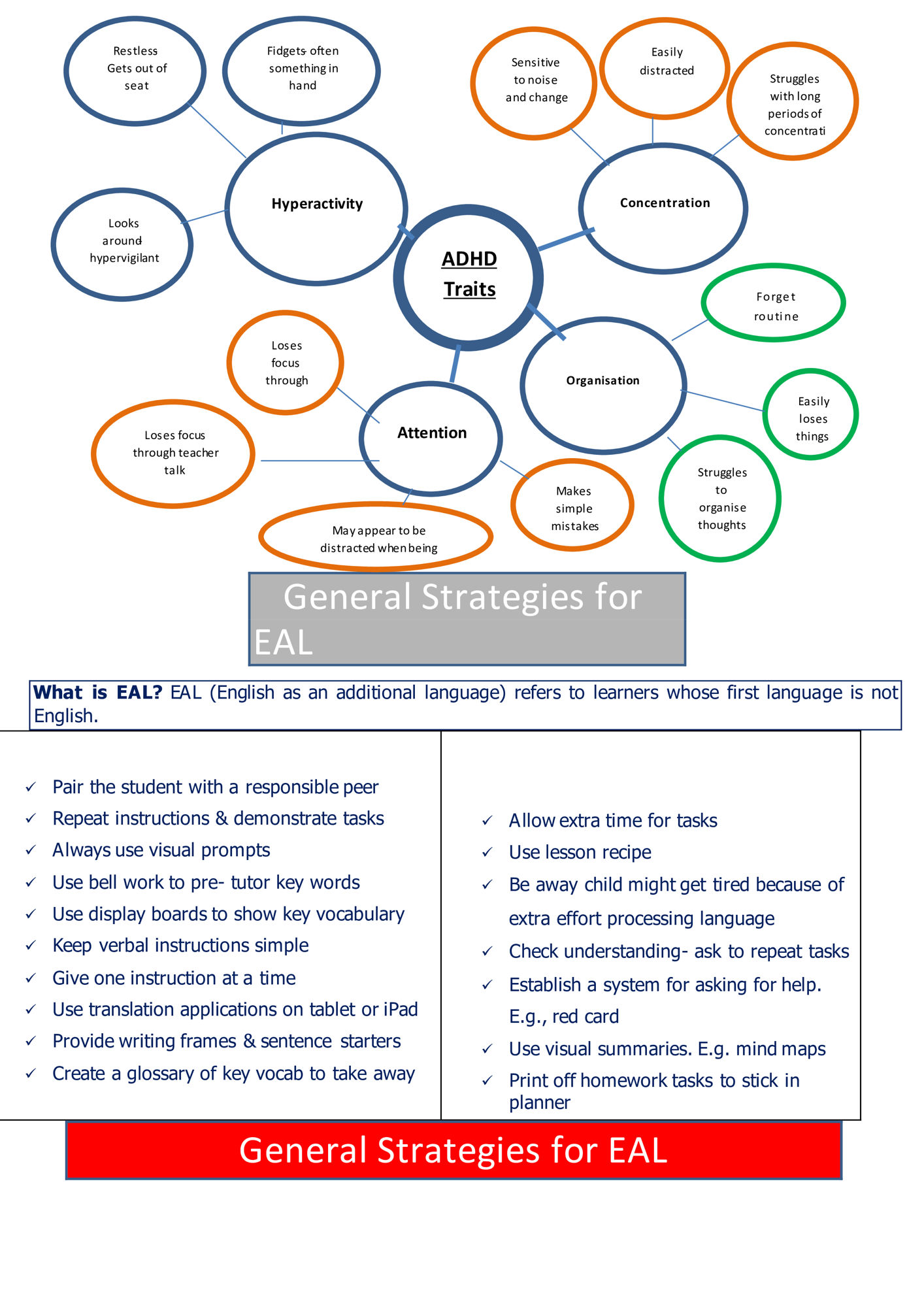
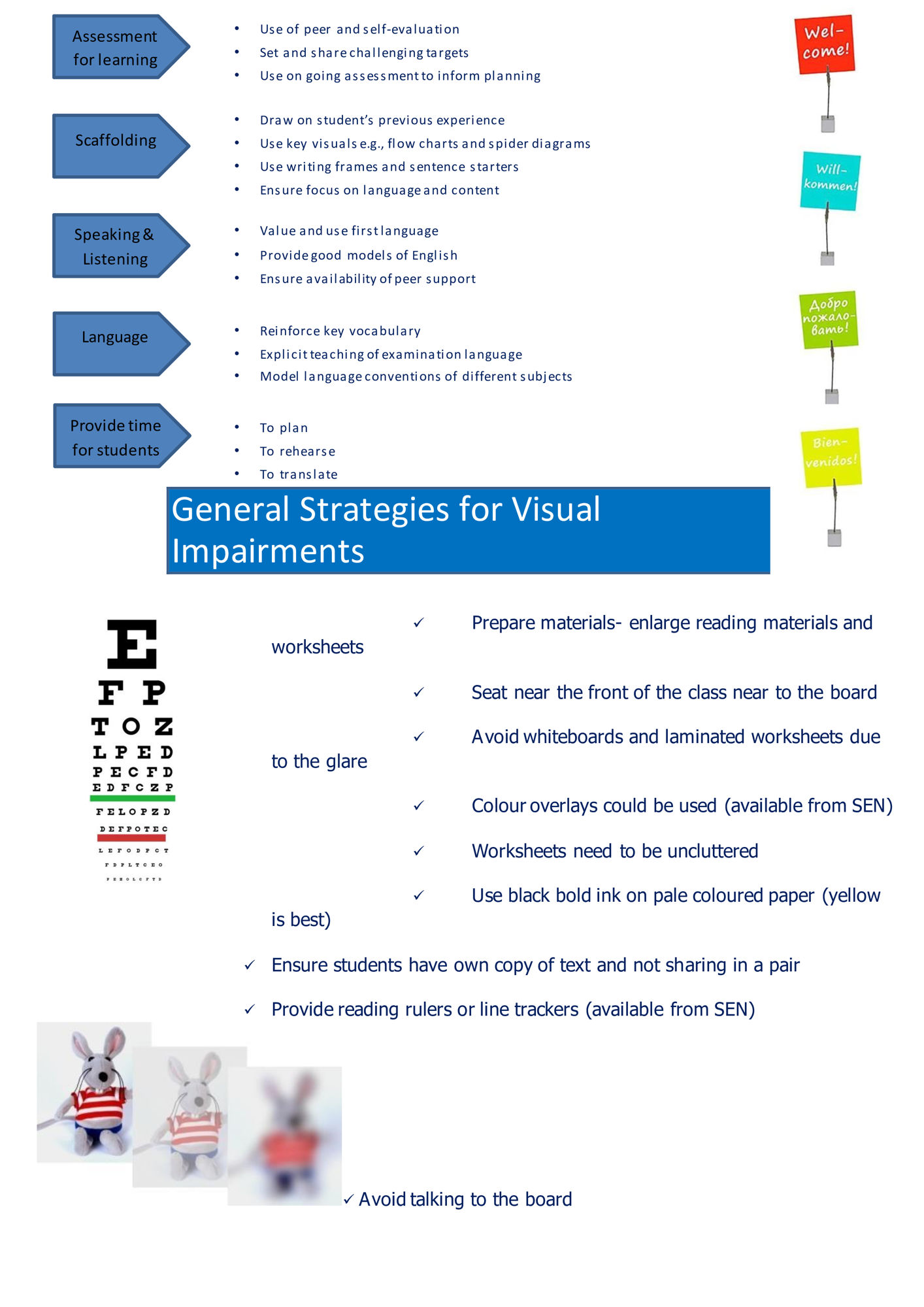
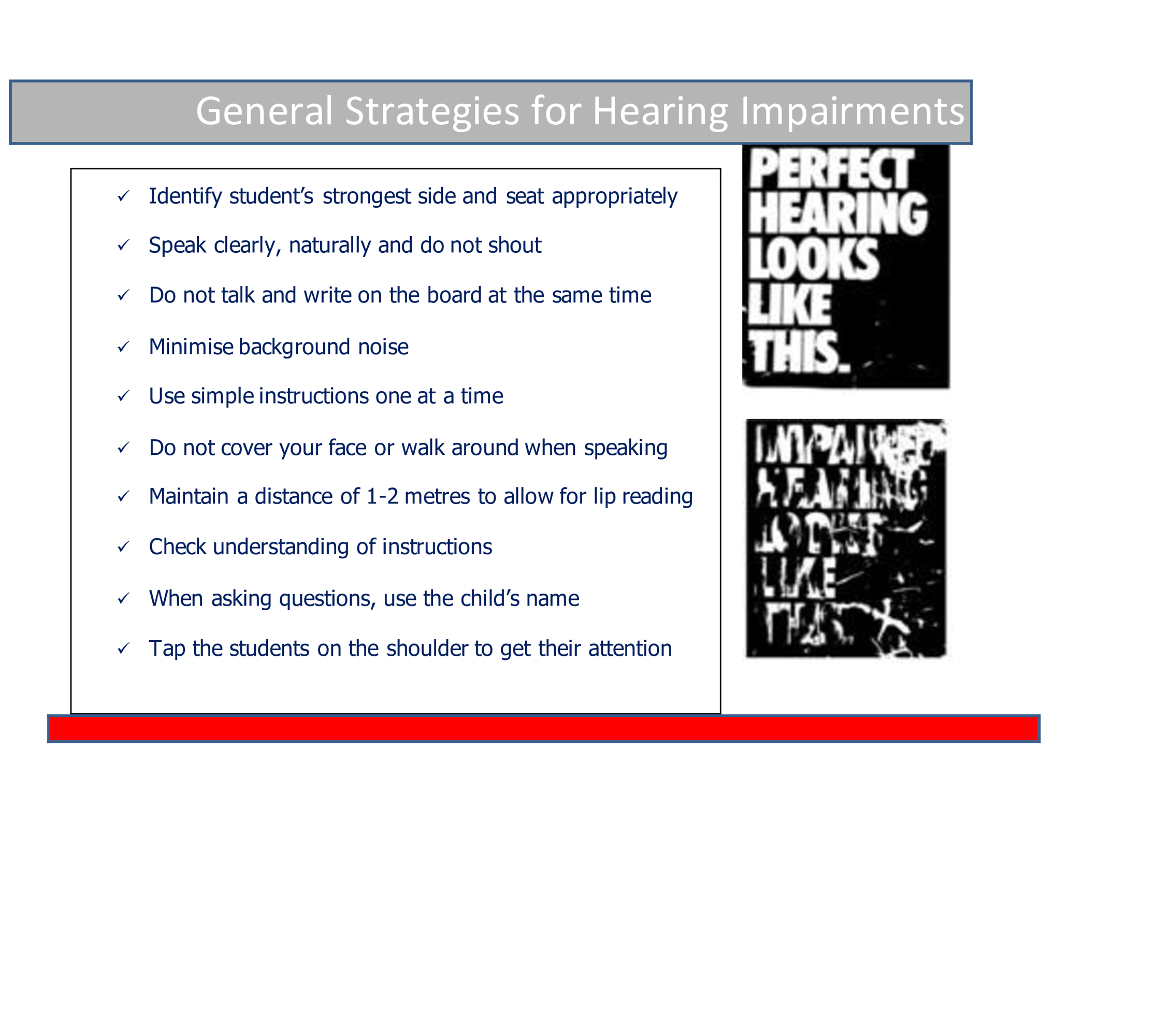
FAQs
You refer to 'Equipping every student with the knowledge, drive and character necessary for success at University and beyond'. How does this fit in with SEND?
Firstly, it is important to note that all further & higher education and apprenticeship routes are valid next steps for our students. Choices are important and must suit the individual. At Beaulieu however, it is imperative that all children, whatever their background or ability believe that University or further education is a viable choice for them and that these pathways are not reserved for those from more affluent backgrounds. At Beaulieu, we believe that education is the key to a happy, healthy, socially mobile/adaptable and fulfilled life. We refuse to place limits on our students and believe that each one of them, when they leave us, should be in a position where they can make strong, clear and confident choices about their future.
If your son or daughter has special needs or a disability (SEND), university might appear overwhelmingly difficult and maybe even not a possibility. However the message from universities is that they very much want applications from SEND students, and have well-established means of easing their path.
According to UCAS, nearly 40,000 students with a declared disability took up undergraduate places in 2016 – that was a record, and numbers are expected to climb further. Manchester University state that 11% of its students have disabilities.
Should I declare a disability?
Some students, particularly those with a less obvious special need such as dyslexia or mental health problems, wonder whether it is wise to declare this on the UCAS form. The resounding answer from admissions departments is yes. It will not adversely affect your application – you will be judged on academic merit alone, the same as everyone else. However it will allow the universities to help you with getting any additional funding you are entitled to, and to work with you to provide any extra support you may need. Speak to the additional needs department – they will be happy to help you both before and after admission.
Choosing the right university: tips for students with special needs
Once you have narrowed down the appealing courses, you need to do your homework on the campuses. The open days can be very busy – Exeter has recorded 10,000 visitors to its open days – so if you have difficulties with crowds you may want to arrange a private visit on a quieter day with the disability co-ordinator.
Be sure to meet the disability support officers in person. Are they welcoming and enthusiastic, do they have a can-do attitude, do you feel you could go to them if you had a problem? Take note of where the office is situated which will tell you a lot about the university’s stance – in a well-resourced central office, or a broom cupboard at the edge of campus?
Ask the university how many people it has with your condition – if it’s common, expect that to be reflected in student numbers. And ask whether you can be put in touch with a current student with similar difficulties to you – they will be able to give a first-hand view on how well the university can cater for you.
Students with physical disabilities
If you have mobility problems, the hilltop universities such as Exeter and Leeds might be problematic. Before you visit for a recce it’s worth looking at the website www.disabledgo.com, a superb resource which has detailed information on each university and the accessibility of its libraries, student union, lecture halls etc, with in-depth detail on aspects such as the measurements of doorways, how heavy the doors are, where the disabled toilets are and what side transfer they have.
Remember to look at not just your own accommodation, but whether you can you get into the rooms where friends will be living, so you don’t miss out on the social side of things.
And don’t forget the extra-curricular – one student shortlisted Cardiff and Nottingham as they had nearby wheelchair rugby teams.
Students with autism/Asperger’s
The last five years has seen great strides in the support and understanding extended to autistic students, and a resulting 200% increase in university students on the autism spectrum.
Several universities including Birmingham City, Cardiff, Bath, Cambridge and Aberystwyth run a three day autism summer school, to help with the transition from school to university. These include stress and anxiety workshops, talks from other students with ASD, sessions on safe socialisation and coping with teamwork, and an opportunity for students to familiarise themselves with student accommodation and the campus.
Others offer bespoke support packages. Warwick University will guarantee on-campus accommodation to autistic students, and offers an early arrival induction programme, mentoring to help with managing interaction with other students, and mental health support.
Brighton University’s mental wellbeing support officers help with settling in, offer one-to-one study skills assistance, advise tutors and lecturers on the best way of working with autistic students, and can organise extra time or rest breaks in exams. Leicester University can provide specialist support workers and one-to-one support from a study assistant for autism.
What financial help is available to students with special needs?
On top of the usual loans to cover tuition fees and living expenses, you can get grants towards travel, specialist equipment, and non-medical help. If you have an existing care package, this can be transferred to your university.
Disabled Student Allowances can be paid in cases of physical or mental impairment, long term health or mental health condition, and specific learning difficulties (SpLD) such as dyslexia (note following cutbacks, since September 2015 this can only be paid in the case of an SpLD which is ‘complex’).
These allowances are paid according to need, and are currently up to a maximum of £5,212 for specialist equipment, £20,725 per year for non-medical help, and £1,741 for general expenditure – but unlike student loans, these grants do not need to be paid back.
Disability travel costs are also payable with no ceiling, but only where these are extra to the usual student travel expenses. You can also qualify for an additional living cost loan of £1,000, which is not means tested.
It can also be possible to get a large room in the halls of residence at the standard room rate, where this is needed as a result of a disability (and not just a physical disability, but also for example where a student with ASD will spend much more time than normal in his room).
Universities are obligated to make your course accessible under the Equality Act – so you can negotiate with them to provide for needs such as specialist equipment, a sign language interpreter, IT equipment, a level access shower, or accommodation for a carer.
Aside from state funding, investigate trusts such as The Snowdon Trust – which will give grants for essential study needs which are not covered through other funding streams. UCAS advises that you start applying for financial help six to nine months before a course begins.
Communicating with parents
It’s important to realise that once the child reaches university he or she will be treated as an adult, and the university will not communicate with parents without the student’s express permission.
My child has a physical disability and uses a wheelchair. Is your site accessible?
Beaulieu is a new build, with level floors, wide doorways, lifts and adjustable desks / workstations in practical spaces. If your child uses a wheelchair, they should cope very well at Beaulieu.
My child has ADHD (or similar diagnosis). How will you help them to learn and develop?
Our approaches to teaching & leanring and towards positive behaviour for learning create an environment where children with ADHD can succeed.
The following is taken from the ADHD Foundation report, 'Teaching and Managing Students with ADHD' (2018). The full report is at the bottom of the page.
“Students with ADHD feel safe and secure if they know what to expect. With regular routines and rituals, they become more familiar with what they need to do. The more you can keep to routines and rituals, the better. Any change simply creates distraction, uncertainty and confusion.
Getting students with ADHD to learn how to develop a sequence of events in the right order will bring about real improvements in their academic performance.
(If behaviour needs to be challenged), act as quickly and firmly as possible, otherwise the child with ADHD will not be able to relate to the incident after the lapse of time."
At Beaulieu we have a very clear and consistent classroom approach for teaching and learning, behaviour for learning and personal development. Clarity of expectation, practice and routine is extremely important for children with ADHD to succeed. If a situation needs to be dealt with, it is done so rapidly so that an action and a consequence can be more easily connected by the student.
At Beaulieu our expectations are extremely clear and consistent across the school and from teacher to teacher. There are not a range of expectations and a flexibility in rules which can prove confusing and particularly for those students with ADHD. All children need a period to learn a new routine when they join our school and some take longer than others. We understand this and help children to learn our routines. They are all very successful at doing this.
Will my child be assigned an LSA when they join Year 7?
No, unless your child has an EHCP that explicitly states the requirement of a 121 full-time LSA.
The Education Endowment Foundation have undertaken extensive research into the effectiveness of Teaching Assistants (LSAs) and their impact. Studies have repeatedly found that often, LSAs have little impact and indeed can sometimes be detrimental to pupil progress.
We do not have many LSAs at Beaulieu – one or two per year group. We believe that as the expert, the teacher is the member of staff that should be giving their full attention to the learning and development of students – especially those that need it most.
The LSAs we do employ are used to support children with specific needs where this is necessary. Even in this instance, the approach is to support students to be independent. LSAs spend as little 121 time with any student as possible, aiming to minimise their feeling of ‘difference’ from their peers, reduce dependency and encourage self-esteem. We operate a 'helicopter' approach as much as possible.
Some of our LSAs are qualified teachers and support through small group interventions in English and Maths.
Do you have a staffed base for students to go to if they need time out or quiet time?
No.
Our structure and routines mean that it is incredibly rare for a student to need to leave a classroom at Beaulieu. They feel calm, cared for, safe and supported in our warm, peaceful classrooms.
Our climate means that Beaulieu does not need a room for multiple children to go to because they are stressed, emotional or displaying behaviours that are out of control.
We care deeply for our students. For every moment of the day there are always staff on duty should an individual student need support out of the classroom. A teacher can contact this nominated member of senior staff at any time.
There are pastoral drop-ins for students before and after school and during breaks too should they have concerns or worries.
Interventions for e.g. Lexia, Reading, Maths Passport etc. take place in small groups in identified rooms. We pick the best room for the intervention.
For families of existing Beaulieu students with SEND:
1. Who are the best people to talk to at The Beaulieu Park School about my child’s difficulties with learning, special educational needs or disability?
- Talk to your child’s subject/class/form teacher about your concerns. It is likely that the class teacher will have discussed your concerns with the school SENCo.
- You may wish to arrange a meeting with the SENCo.
2. How will the school let me know if they have any concerns about my child’s learning, special educational needs or disability?
- If your child attends the primary school, your child’s class teacher may initially speak to you at the beginning or the end of a normal school day and arrange a further time to discuss the concerns.
- If your child attends the secondary school, the SENCo will contact you and may need to arrange a meeting to discuss your child’s difficulties with learning and any possible support strategies the school might be considering.
3. How will the school consider my views and those of my child with regard to her/his difficulties with learning, special educational needs or disabilities?
- At The Beaulieu Park School we believe it is very important for parents/carers to be involved in all areas of their child’s learning and we actively encourage discussions. We believe, where appropriate, that it is essential to understand your child’s views on any difficulties they may experience with their learning.
- You will be able to share your views and discuss your child’s progress at regular meetings with the class/form/subject teacher and others.
- If your child has an identified special educational need you will be invited to a termly meeting with the SENCo/Lead Learning Assistant to discuss current progress, support strategies being used and expected outcomes.
- If your child has an Education, Health and Care plan (EHCP) you and your child will be able to share your views at the Annual Review.
4. How does The Beaulieu Park School ensure the teaching staff are appropriately trained to support my child’s special educational needs and/or disability?
- At The Beaulieu Park School we believe that your child’s learning needs will be met through the high quality teaching delivered by her/his class/subject teacher.
- We regularly review the school training schedule and professional development for all teaching and support staff to ensure there is the appropriate expertise to support children with special educational needs.
- The school is able to access training programmes from different organisations including the Statutory Assessment Service.
- Individual training can also be arranged when necessary.
5. How will the curriculum and the school environment be matched to my child’s needs?
- At The Beaulieu Park School we believe that your child’s learning needs will first be met through the high quality teaching delivered by her/his class/subject teacher.
- We carefully plan our curriculum to match the age, ability and needs of all children. The class/subject teacher will adapt lesson planning and teaching to match your child’s special educational needs and/or disability.
- It may be appropriate to adopt different strategies or resources and adapt outcomes to meet your child’s learning needs.
- Additional specialist advice is sought when appropriate and, when necessary, accessibility aids and technology may be used to support your child’s learning.
- The Beaulieu Park School regularly reviews its Accessibility Plan to ensure that all children have the fullest access to the curriculum and the school site as possible.
6. What types of support may be suitable and available for my child?
This really depends upon the nature of your child’s needs and difficulties with learning. But our education provisions will match the needs of the four broad areas of need as defined in the SEND Code of Practice 2015;
- Communication and interaction
- Cognition and Learning
- Social, emotional and mental health
- Sensory and/or physical needs
At The Beaulieu Park School we have a 3 tiered approach to supporting a child’s learning.
- Universal – this is the quality first teaching your child will receive from her/his class/subject teacher and may include some very minor adaptations to match learning needs.
- Targeted- it may be appropriate to consider making additional short term special educational provision to remove or reduce any obstacles to your child’s learning. This takes the form of a graduated four part approach of a) assessing your child’s needs, b) planning the most effective and appropriate intervention, c) providing this intervention and d) reviewing the impact on your child’s progress towards individual learning outcomes. Specific targeted one to one or small group interventions may be run after the school day and/or potentially on Saturday mornings. You will be kept informed of your child’s progress towards learning outcomes.
- Specialist – it may be necessary to seek specialist advice and regular long term support from a specialist professional outside the school in order to plan for the best possible learning outcomes for your child. This may include educational psychology, speech and language therapy, occupational therapy, sensory advisory teachers and the child development service. The school may need to prioritise referrals to these services. However, for a very small number of pupils access to these specialists may be through an EHC Plan. The current interventions provided at The Beaulieu Park School include:
- High quality teaching and learning
- Numeracy and literacy classes (additional)
- After school enrichment
- In/Out of class support from learning assistants/SEND team
- Essex EP Service
- Outreach support – various partners
7. How will you support my child to reach his/her learning outcomes?
- The class/subject teacher and other staff working with your child ensure that your child receives appropriate teaching and support in order to reach these goals. The learning plan, strategies and progress will be reviewed termly.
- External agencies and specialists may also review your child’s progress and adapt their planning accordingly.
8. What is an EHC Plan and who can request one for my child?
The purpose of an EHC Plan is to make special education provision to meet the special educational needs of a child or young person, to secure improved outcomes for him/her across education, health and social care and, as he/her gets older, prepare for adulthood. An EHC Plan will contain;
• the views and aspirations of you and your child,
• a full description of his/her special educational needs and any health and social care needs, • establish outcomes for your child’s progress,
• the provision required and how education, health and social care will work together to meet your child’s needs and support the achievement of the agreed outcomes.
You, your child (where appropriate and aged 16 and over) and the SENCo or Principal or Head of Primary School, can request that the local authority conduct an assessment of your child’s needs. This may lead to an EHC Plan.
9. How will you help me to support my child’s learning?
- There may be suggested strategies or activities for you to do at home to support your child’s learning.
- We sometimes run parent/carer workshops in school to help you understand the strategies used in school. In addition, we may be able to offer you individual training in specific support strategies relevant to your child.
- The SENCo/Lead Learning Assistant may also support you with strategies, resources and ideas for supporting your child’s learning at home.
- You may have an opportunity to meet with other professionals involved in supporting your child.
10. How is support allocated to children and how do they move between the different levels of support in school?
- The Beaulieu Park School receives funding from the Education Funding Agency and the local authority. These funds include money to support the learning of children with SEND and/or disabilities.
- The Principal, in consultation with the School Governing Body, decides the budget for SEND provision on the basis of the needs of the children in the school.
- The Principal and the SENCo discuss the effectiveness of the school’s current interventions and provisions and prioritise an action plan, which may include additional or alternative interventions, staff training and equipment needs.
- This process is reviewed regularly to ensure the best possible intervention is provided to those children who require additional support to learn.
11. How will the school know that the support has made a difference to my child’s learning and how can I and my child be included in this review process?
- Your child’s progress will be assessed both in terms of his/her regular learning within the class/subjects and with regard to specific intervention programmes.
- The impact of the support given is carefully measured to ensure that the learning outcomes have been achieved and if not, what adaptations are necessary. It may be decided that a further period of intervention would be beneficial for your child.
- You and your child will be kept informed and encouraged to be actively involved at all stages of this support.
12. What support will there be for my child’s happiness and well-being at The Beaulieu Park School?
- At The Beaulieu Park School we believe that the happiness and well-being of all our pupils is paramount. All members of staff take this aspect of school life very seriously.
- You can be confident that in particular your child’s class/subject/form teacher, the teaching assistants, Head of House and the SENCo are available to provide support to match your child’s needs.
- You should also feel free to contact your child’s class teacher if you have any concerns.
13. How is my child included in all the same activities as his/her peers at school?
- The Beaulieu Park School is an inclusive school and committed to providing equal opportunities for all children.
- Co-curricular clubs, educational visits and residential trips are available to all children.
- When necessary the school will make reasonable adjustments to ensure that children with SEND and/or disabilities are included in all activities.
- You should also feel free to contact your child’s class/form teacher if you have any concerns.
14. How will The Beaulieu Park School support my child in transition stages?
- We liaise closely with the school or nursery your child is transferring from. We are able to discuss with the relevant teachers any individual needs and how best to support your child in school.
- While at The Beaulieu Park School we take care to ensure that during transition points (between classes each year and at the end of Key Stages) all staff are aware of individual pupils needs, learning progress and best support strategies.
- The Beaulieu Park School makes arrangements to ensure there is a smooth transition when your child transfers to his/her secondary school of choice. Please contact us for further details.
- If your child has an EHC Plan, we will participate and/or facilitate its review in sufficient time prior to him/her moving between key phases of education. You will be kept informed of these arrangements and asked to attend the reviews.
- From Year 9 all EHC Plan reviews will have a focus on preparing for adulthood, including employment, independent living and participation in society.
15. Who can I contact if I have a complaint about the SEND provision made for my child?
Initially speak with your child’s teacher and/or the SENCo. Hopefully they will be able to address your concerns.
You can then contact the Principal, who may direct you to the school’s Complaints Policy if necessary.
Downloads
| Page Downloads |
|---|
| Teaching and Managing Students ADHD 2018 |
| SEND Local Offer |





